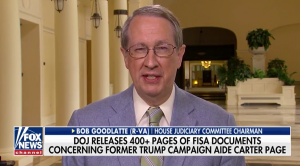 GING-PAC endorsed Congressman Bob Goodlatte (R-VA) published this op-ed on August 3. It is an important read for all Americans:
GING-PAC endorsed Congressman Bob Goodlatte (R-VA) published this op-ed on August 3. It is an important read for all Americans:
The Richmond Times-Dispatch
By Congressman Bob Goodlatte
August 3, 2018
In October 2017, the House Judiciary and Oversight committees launched an investigation into decisions made and not made by the Department of Justice and Federal Bureau of Investigation during the 2016 U.S. presidential election. Our investigation is not about former Secretary of State Hillary Clinton or President Donald Trump. It is about how investigations of U.S. citizens are to be conducted with impartiality and without regard to political affiliation in order to protect Americans’ civil liberties.
As part of our investigation, we have aggressively used tools at our disposal, including the issuance of a subpoena, to get access to critical documents needed for our investigation. Some have wanted to go further and have called for the impeachment of Deputy Attorney General Rod Rosenstein. While obtaining the cooperation of the Justice Department and the FBI for document production and witness testimony has been frustrating, impeachment of Rosenstein is not the appropriate course of action and would do nothing to help speed up the production of documents.
Our investigation must continue and we must have access to critical documents pertaining to the Justice Department and FBI’s handing of both the probe into Clinton’s use of a private email server to send and receive classified information, and its investigation of unverified claims of the Trump campaign’s collusion with Russia to interfere in the election. We are deeply concerned about political bias exhibited by top officials at our nation’s premier law enforcement agencies and how it led to these investigations being handled differently.
For instance, the Justice Department and FBI did not treat Clinton like any other criminal suspect and deviated from standard investigative procedures. Throughout the course of the investigation, former FBI Director James Comey decided which DOJ procedures to follow and which not to follow, and he assumed the roles of investigator, prosecutor, and exonerator.
The FBI allowed two Clinton employees who were witnesses to sit in on her interview. Before key witnesses were even interviewed, including Clinton herself, Director Comey drafted an exoneration memo. Comey and his team changed the term used to describe Clinton’s use of a private email server to send classified information from the standard that created culpability, “gross negligence,” to a made-up standard without any legal effect: “extreme carelessness.” This change ensured Clinton’s conduct did not violate the law, permitting Comey to manufacture a decision to not recommend charges, despite a legal standard of gross negligence.
Moreover, the FBI intentionally obscured the fact that President Obama had communicated with Clinton’s private email address by editing Comey’s final press statement, replacing “the president” with “senior government official.” These are just a few examples of the FBI’s investigative irregularities in the Clinton investigation.
Contrastingly, Comey treated the Russia investigation differently. He memorialized conversations with President Trump and leaked them to the press. Text messages exchanged between FBI employees Peter Strzok and Lisa Page reveal stunning political bias against President Trump. They went as far as to say “we’ll stop” Trump from becoming president. Indiscretions involving Strzok and Page were not handled appropriately at the time FBI management learned of them, resulting in their continued assignment as key players on the Clinton and Russia investigations.
Further, the FBI was granted a court order to surveil a former Trump campaign adviser for allegations of collusion with Russia based on an unverified dossier compiled by a foreign national at the behest of the Clinton campaign and Democratic National Committee. The details about how the dossier was obtained were not fully disclosed to the judge who approved the government’s request to surveil a U.S. citizen.
The actions taken by DOJ and the FBI during the 2016 election create a perception of political favoritism, cast a shadow over the proceedings of law enforcement agencies, and undermine Americans’ trust in key institutions. Our law enforcement agencies are afforded a vast amount of power to enforce the law, and with such power comes the expectation it will be used justly and fairly. Left unchecked, decisions motivated by political bias have the potential of permanently eroding public trust in our justice system.
Our role in Congress is to follow the facts wherever they may lead. Our investigation is not about politics and it is certainly not about interfering with Special Counsel Robert Mueller’s investigation. Our investigation is about ensuring our justice system treats everyone equally under the law, a goal that those on both sides of the political spectrum should support. It is imperative that DOJ and FBI decision-makers influenced by bias be held accountable for their actions, and we must do everything in our power to put in place stronger controls to prevent similar abuses from occurring in the future.
Bob Goodlatte represents Virginia’s 6th Congressional District in the U.S. House, where he chairs the Judiciary Committee. Contact him through his website at https://goodlatte.house.gov/.